 Baby birds chirp from moss-draped oaks and ducklings scurry after their mothers at the pond. Blooms explode in beds. Wildflowers pop up in yards. Butterflies and bees flit from my sunflower to Purple Queen, then travel to my neighbor's yard to sample their plumbago. I'm energized by nature, so you'd think all this new life and activity would inspire my brain to spin story. It hasn't. A couple weeks ago, I brainstormed a story with my agent and I was excited by the ideas it sparked. The story had a relatable protagonist, an intriguing premise and the potential for a satisfying outcome. The setting was moody, mysterious and a little quirky. There was a touch of magic. The magic grew and grew, and the plot took unexpected turns. As the story developed, my shoulders and neck tensed, and panic crept into my head. I asked myself why and had a revelation. I had allowed my imagination to veer too far from my life experience, and the story began to feel forced. For me to write authentic story, it needs to grow from people and experiences I relate to, and the magic needs to evolve organically. It's a valuable lesson. It helps me know myself better as a writer, and I hope it will help me write better books. But it wan't easy giving up that story. I'm restless and anxious when I'm not productively creating. I have another story started. It's growing slower than I'd like, but I'm trying to be patient. I think I'll go outside and commune with the flowers and bees. Maybe they'll buzz plot to my muse!
0 Comments
 Storm is a good word for what happens to my brain when a story erupts. I'm a fourth generation Floridian, I grew up with storms, and heard stories of hurricanes past. I love and fear them, as I do story. I love reading and creating stories and I fear I'll never do the stories in my head justice. I just finished a book and passed it to my agent. I'm letting go of the story world I've lived in for the last year, saying goodbye to the characters. Next week, my agent will submit the book to publishers, hoping to find a good fit. I've learned it's best to not waste energy on wondering if I did my best or expectations for its success. Instead, I focus on the next project. The idea for a new story came to me a while ago. I put it in a box. I lifted the lid every so often and peeked inside, but I didn't take it out of the box until last week. I listed all that I knew about the characters and their world. Then I shared it with my agent. She poked and prodded and asked lots of whys and what ifs. My husband and I walk every morning and for the last two days those whys and what ifs have fueled our steps. I walked over three miles yesterday, trying to figure out where a boy named Ash came from and why a girl named Roan was allowed in the woods. The answers to those questions lead to more questions. They twist and churn into a tornado. Soon, I hope, the beginning will pop out of that storm. It's a magical moment when the main character takes her first steps on a clean page, and she brings a steady rain of words to fill the pages after. I pray they're the right words to describe the storm in my head. I think most writers collect bookmarks, not necessarily on purpose. Bookmarks are passed out to promote new books, so if you're supporting other authors, you'll take their bookmark. Friends and family add to the collection. What do you buy a writer? A pen, a notebook or a bookmark. I don't use most of my collection. They're just too pretty or they make dents in pages. Don't get me started on my feelings about disfiguring books! But I do love my bookmarks, no matter how dysfunctional they are. I shared pictures of my collection here several years ago, but it's grown so much, I thought it was time for an update. Harry Potter and much loved animal bookmarks. I'm not a Gryffindor, I'm a Ravenclaw, but I don't think Hermione will mind if I use their bookmark. I know Harry and Ron won't. They shy away from books! Bookmarks from my grandmother and favorite aunt. I use them in my Bible, my grandmother's Bible and mother's Bible. They connect me to these strong women, their faith and history. Mementoes from museums, libraries and bookstores I haven't visited. Not in person. But these invite me to come. They invite me to imagine places I've never been. Fancy doodads adorned with jewels, silver charms, silky tassels and dried flowers. Pure treasure! And last are the bookmarks that promote stories. They don't sparkle or shine. They don't have magnetic grips or tassels. They're just plain, old printed paper. But I use them a lot and they work hard every day to remind me of the books they represent.
All of these bookmarks come from friends and family, so they'll always be special to me. Do you have a collection? A favorite? For the first time since I joined my critique group the Skyway Writers, we took a summer hiatus. Most of us are traveling, restoring body and spirit, feeding the muse with new sights and experiences. We keep in touch through email and social media. Writing is never far from our thoughts and if there's a need, we're available for input on book projects.
Although I didn't leave town, I did honor my muse with a summer conference, a mini workshop and trips to art shows and bookstores. And I wrote. Still, July felt like a creative desert. It stretched long and hot, and I squinted to see the end. I missed my group. I guess I'm slightly addicted. We're a seasoned, serious group. There are five of us, three with books published and two with agents working to sell first books. We aim to publish books until the day we die. And we want them to be good books, so we hire freelance editors to review our work. But before agents, editors or readers see our pages, we look for a thumbs up from each other. We meet every two weeks. If we have pages we want reviewed, we offer our best effort. When we give input, it's presented with love and sensitivity, but fully loaded with honest critical feedback. Every book is a journey and we travel that path together, sharing triumphs and failures that weave into our bond. Twice a year, we retreat to a quiet rural spot where we write, brainstorm and gather around food. For three days we share a guest house on a lake and our muses run free. As the sun goes down and the stars appear, we come together to discuss, celebrate and laugh. Having good writing partners is a blessing I'll never take for granted. Not all groups are alike. It can be a challenge to find the right fit. But a tight knit, productive group doesn't happen overnight, so if you're in a group you're not satisfied with, it might be worth the effort to help it grow. In my next post, I'll talk about what I've learned in a decade of critique groups: what makes them work, what pitfalls to avoid and how to make them flourish. Next week, the Skyway Writers will reunite. Energy will pass between us, and when I leave, I'll be refueled. It will feel like walking out of the desert and into the sea.  Racetrack Orphan by Susan Banghart Racetrack Orphan by Susan Banghart Being an animal lover and a writer of children's books, I was fascinated with an interview I heard of an organization called Red Rover. Besides providing shelter, resources and finances for animals and people in crisis, they raise awareness in children through their Reader's Program. It's aimed at educators and provides a list of books for ages 5-11 that inspire understanding and empathy, like Buddy Unchained, Hens for Friends and Rescue and Jessica: A Life Changing Friendship. The books are sorted by theme: Domestic Animals, Pet Loss, Wildlife and Animal Behavior. A three-week online course teaches how to maximize the impact of the books with discussion questions and activities. For kids who prefer a digital experience, Red Rover offers a bi-lingual app. It targets ages 7-11 and functions like a graphic novel, adding pop-up questions, discussion topics and games to help kids practice emotional awareness, critical thinking and compassion. Red Rover also publishes Kind News magazine, for 8 and up, and Kind News, Jr, for ages 5-7. The magazine teaches how to care for pets and how to take action to improve animals' lives. In March, Red Rover participated in Read Across America and gave one lucky educator a $200 bookstore gift card, plus a year's subscription to Kind News magazine. I like to imagine the kids in that classroom being so inspired they become animal and human rights advocates. I love stories about books making a difference. Red Rover is using them in a big way to make this world a better place. They have a host of powerful videos. Here's one: 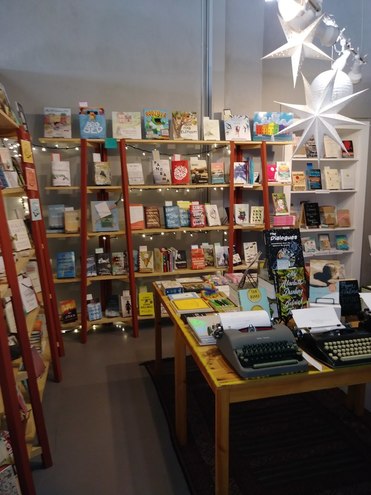 Until I began my journey as a writer, I never fully understood what it took to create a novel. I knew writers had to write them and publishers print and bind them, but I imagined it as a charmed process, with ideas springing to life on the page. Painlessly, seamlessly, in the blink of an eye, there's a book. If you're an author or someone who supports authors, I'll give you a minute to stop laughing before we continue. Done? Okay, let's move on to reality. Most books take years to achieve. First a writer has to learn how to write a good story. That is not a speedy or painless process. Part of that education is writing books. All of them start with an intriguing idea. It may ferment in the author's head for decades before it grows big enough to be a first draft. First drafts take some people months and others, a year or longer to write. And revision, please, lets talk revision. How many drafts is enough? I don't count anymore. My critique group gets my second draft to review. Then I analyze plot and character arcs, map scenes, scribble notes all over the place. Many drafts later, my agent is allowed to see it. Of course, she has suggestions, all of them excellent, for making a better story. Yesterday, after a month or so of brainstorming and revising, I sent my manuscript back to her. I'm waiting for her response. Is it ready to take the next step, be submitted to publishers? Often, I hear books being referred to as babies, birthed on the day they're offered to the public. But I think they're born when they're released from the author's head. My story is now a toddler, taking wobbly steps, hoping to grow into a real book. This is what it looks like today: This is what I hope it grows up to be, a beautiful middle grade book, like my friend Augusta Scattergood's. If you're an aspiring author, I wish you courage and perseverance, and the confidence to believe in your abilities and your books. If you're not a writer, but you love books, I hope you'll treasure them all the more, knowing how hard they worked to reach you.
 I've been querying agents for about eight years. When I started, I kept a hand-written journal, noting the dates and responses I received from my list of carefully researched agents. The last two years, I abandoned my journal for a digital spread sheet. February 12, 2018, I typed the final entry: SIGNED WITH MY AGENT! Ten years learning to write. Four novels queried. Over ninety queries sent. Seventy-one rejections. One offer to represent. The other nineteen agents were informed that I signed with an agent, so I don't know how they would have responded to my work. I've always learned from and been inspired by posts about authors' journeys to acquiring an agent, so I thought I'd share a bit of mine. When I submitted my first book, I had no idea how far I was from being ready. I sent off the requested pages, along with a horrible synopsis. I'm sure it was the easiest rejection of the day for every agent on my list. Was I crushed? Yes, but I moved on. I took online classes, read books on craft, joined two critique groups on top of the one I already belonged to, thinking I'd learn three times faster. And I revised over and over and over again. Five months later, I submitted my first book again, but more cautiously and to fewer agents. I received two requests for partials. Jump for joy, progress! In the end, they all rejected my dear book. So I set it aside, thanking it for all I'd learned. A year or so later, I queried my second book. By this time, I expected the rejections, but they stung just as much. I took my book to workshops and conferences, read more books on craft and listened to critique partners. By the third book, I knew how much I didn't know and was intimidated by how much I had to learn. I considered an MFA, but, given a writer's earning potential and our budget, I couldn't rationalize spending the money. So I plugged along the path. I knew quite a few published authors by now, and it was wonderful to celebrate their new books. It was also growing harder to imagine my books ever sitting next to theirs on a shelf. I learned to write lovely prose and create enticing concepts. Yes, the third book was also rejected when I queried. But two agents said they'd like to see more of my work! And I discovered something crucial in the agents' responses, the weak spot I needed to focus on . . . structure. I needed to learn how to plot. So for my fourth book, I chose a story that would fall apart without a well-conceived plot. Ignoring the urge to create pretty writing, I gave my character a concrete goal and charged towards that goal on an armored-horse with a lance in hand. I worked on that book for almost two years. It won Florida's 2018 Rising Kite contest. I submitted it to agents the week after and was offered representation one week later. Here's what I learned from this journey: Read new books in the age category that's your focus. Read award-winning books. You don't have to analyze them, but become familiar with what kids are reading today, and soak up the way good stories are told. Learn everything you can about writing for children. There are many good books on craft to choose from. Join the Society of Children's Book Writer and Illustrators. Jump on their forum, ask questions and participate in discussions. Attend SCBWI workshops and conferences for motivation, education, networking and opportunities to pitch your book to editors and agents. Find a good critique group. Your local SCBWI chapter can help with that. Critique partners not only help you grow your book, they help with query letters and they're there to support you. Writers understand writers. When you're facing an inbox of rejections, agents can seem like the enemy. They're honestly not. They work weekends and nights, shuffling through massive piles of queries. They give up their days off because they want to find their next client. They want to find stories they love. So, before you send a query, ask yourself if it will shine in that pile of hopeful submissions. Learn what you can from rejections. If an agent responds with a personal comment, read it carefully. Decipher it. Has she said I'm not relating to the character? Study character emotion and how to put that on the page. Did she not connect with the concept? How can you make it more original and dynamic? Perseverance is your best friend. Embrace it. Feed it vitamins. You need it healthy and strong! No two paths are alike. When you start comparing yourself to someone who published their first book after only two years of writing, put blinders on and focus on telling the stories only you can tell. Every book you write teaches you how to write better. There are no wasted efforts, unless you quit. Don't give up!  Mural, Dowtown, St. Petersburg, FL Mural, Dowtown, St. Petersburg, FL Writers invest a lot of time learning their craft. We study books and blogs and attend talks by authors, editors, agents and teachers, all in an effort to write better stories. We hear pretty much the same advice from everyone: Show,Don't Tell Never Open Your Book With A Dream Avoid Backstory Whenever Possible Shun Passive Verbs Balance Dialog, Action and Internality Get Rid Of Adults (for children's writers) We listen. We take their advice to heart. We work to present dramatic stories with dynamic verbs and sparse backstory. We avoid sleeping scenes with even a hint of a dream. Then apologizing to our beloved parents, we kill off the adults. We advise our critique partners to attack every instance that doesn't follow the rules and we slash the offending sections. So, it's with utter dismay that we pick up the latest award-winning novel and discover it opens with a dream and pages and pages of backstory, or the author uses to-be verbs in every other sentence, or most of the story focuses on adults. I used to frown at these books, scratch my head. Fellow writers and I would discuss the mystery. How did these books get published when they break the rules we've been taught? What I've come to understand is that great books tell a great story. Period. Readers don't know the rules and they don't care. And when it comes right down to it, neither do publishers. No doubt, they want writers to know their craft. They want them to write the best book they can with bonus points for beautiful language and style. But compelling story and voice is what sells books. When I was an art student, we were told, learn the rules, then you can break them. So that's my advice to new writers. Study, learn the rules and apply them. Practice, practice, practice. But don't ever let rules get in the way of your creativity. When you write a first draft, kick them out of your head and let the story flow. Focus on what makes your story original. Run wild with its uniqueness. Tell it the way only you can. The rules will be waiting in your handy dandy toolbox when you revise. Apply them with care, where needed. They should always make your story better. If not, put them aside.  Authors are often asked where their stories come from and they give a variety of answers: dreams, memories, an event that rattles the insides of their brains and demands to be honored, like the bombing of New York's twin towers. Kelly Barnhill, who recently won the Newbery Award with her middle grade book The Girl Who Drank the Moon, talked about the book's origins in Publisher's Weekly. She said an image of a swamp monster spouting poetry sparked the story idea. That image percolated and mixed with her interest in how people see the same thing differently, and her setting was inspired by a trip to Costa Rica. I think most stories evolve like that. A seed's planted, then another and another, growing a jungle of words in our heads. They have to get along at some point, come together in a cohesive way and they have to make us ask "what happens next? That's when our fingers start typing. The book I'm working on now started with drawings I did of fantasy figures I saw in the wood floor of an old house my husband and I were restoring. I imagined a lonely girl finding those figures and the story was born. Another book grew from a longing to commemorate the days I spent riding and training horses and the last book sprang from living in a dynamic urban neighborhood. I like to hear the main character's voice in my head before I start, but I'm not always that lucky. Sometimes, I have to write for a long while before that voice emerges. Since I'm a visual person, setting is vitally important. I need to see the world first, to understand the geography, the buildings and environment. If I try to write without that, the world doesn't feel real. My critique partners and I have discussions about describing our characters. Should we be specific, so readers have clear visuals, or should we be vague so more people can identify with the characters. I rarely know much about my character's physical description at the start of a story. For me, physicality is not nearly as important as personality. Let's not forget plot and conflict. It's what drives the story and I've learned the hard way not to start a story without knowing the protagonist's goal. If you have a story screaming to be written and you don't know the main conflict, take a deep breath, take a walk, take the time you need to figure that out. Explore issues that are important to you, like Kelly Barnhill's interest in the way people's perspectives color their world. Ask yourself how your interests and concerns might shape your character's world. Then ask what your character wants and what's the worst thing that could happen. Now, you have the start of a solid story. What are you waiting for? Start typing! 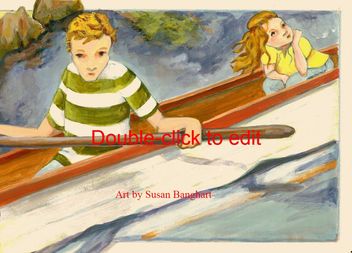 Before readers launch into a literary journey and spend hours and hours reading a story, they must be charmed or fascinated by the protagonist. It helps if the character is funny or feisty. Everyone likes feisty. Feisty faces the world with chin up and eyes blazing. Readers can't wait to see what that character gets up to and they believe whatever she faces, she'll be up to the task. It's tougher to start a story with a protagonist who's downhearted and pessimistic. In her excellent book The Magic Words: Writing Great Books for Children and Young Adults, Cheryl Klein likens the experience to listening to a negative person at a party who goes on and on about their bad luck and how it never changes. Who wants to spend time with that person? She says negative, defeated characters are unappealing. If you start a story with a protagonist who's downhearted, it's vitally important to show they're resilience and assertiveness. Immediately! And humor counts double in this story. So, guess who starts every book with a dispirited, passive person? Yep, that would be me. My muse NEVER imagines characters who wake up on the right side of the bed with a sword drawn to vanquish their enemies. In my critique group The Skyway Writers, my critique partners know I always want their eyes searching for the passages where my character lacks assertiveness. They help me see when she's reacting instead of acting, passive instead of active, finding problems instead of solutions and embracing defeat instead of believing in victory. I think most writers tend to pen protagonists with personalities that echo their own. If you're not a witty and daring optimist, that doesn't mean you can't create appealing characters. You just have to dig deeper, find the parts of you that believe in miracles and have the courage to overcome the most dreadful events. Write the character you hope to become! |
AuthorI write middle grade and young adult books with a magical twist, and I'm represented by the fabulous Leslie Zampetti at Open Book Literary. Writer Websites
Augusta Scattergood Maggie Stiefvater Rob Sanders Fred Koehler JC Kato Sarah Aronson Kelly Barnhill Linda Urban Kate DiCamillo Jacqueline Woodson Helpful Links SCBWI Agent Query Lorin Oberweger - Freelance Editor Search BlogArchives
May 2020
Categories
All
|
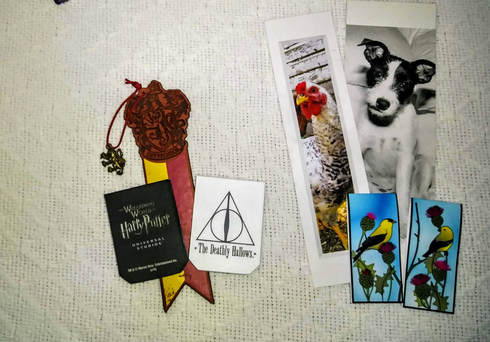
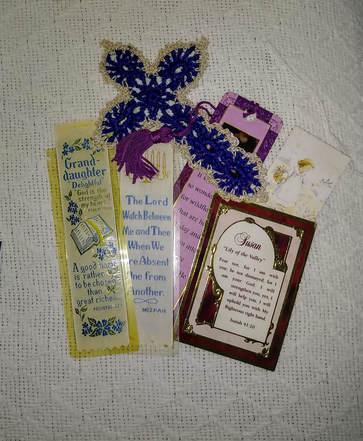
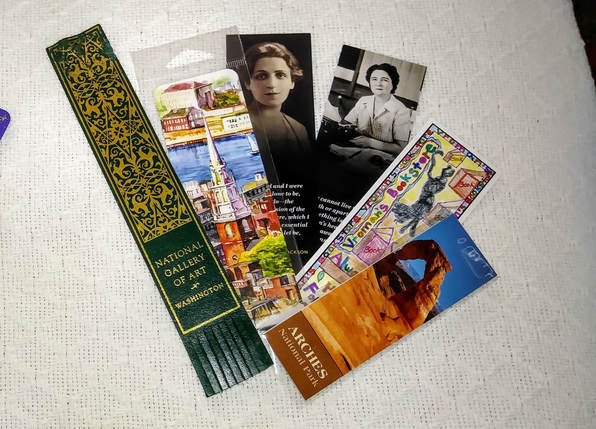
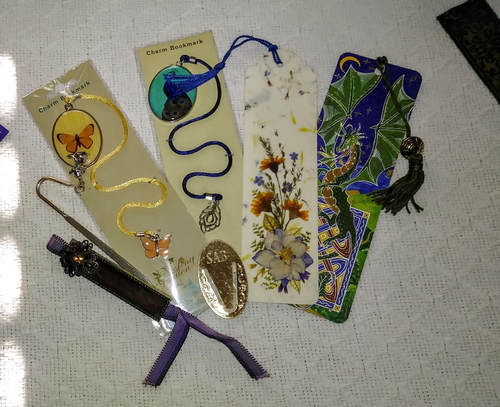
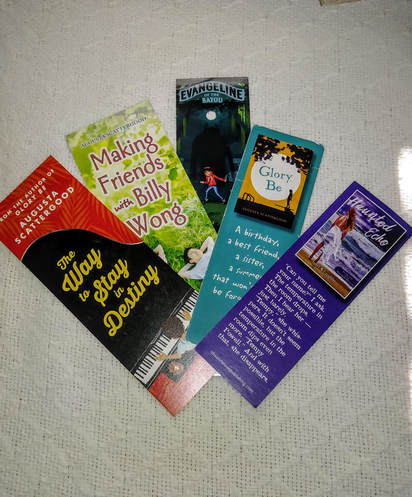

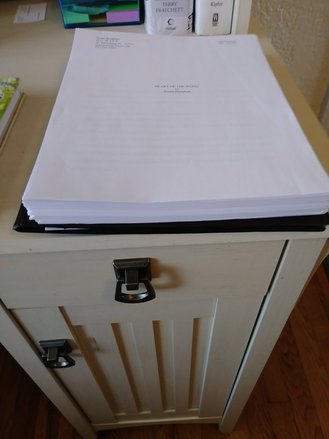
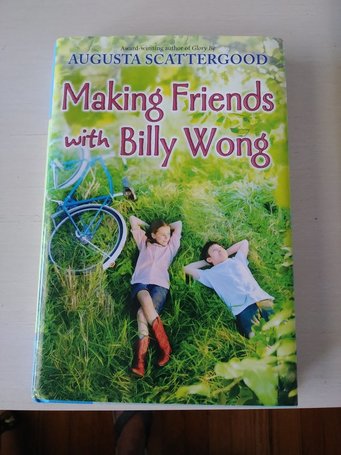
 RSS Feed
RSS Feed
